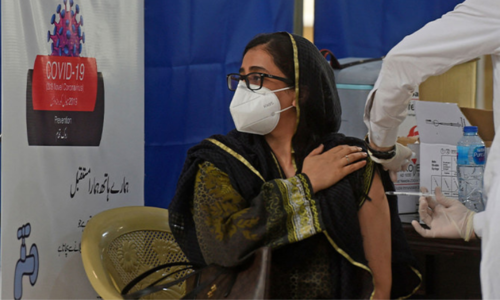• NCOC expects six million doses in a week
• Fully inoculated people to avail air travel from Sept 1
• Vaccination centres to remain closed on Muharram 9, 10
• PM aide informs UK of concern over red list
ISLAMABAD: The National Command and Operation Centre (NCOC) on Wednesday decided to reduce the maximum duration for the second dose from 42 to 28 days after getting assurance from Gavi that around six million doses of Covid-19 vaccine were likely to arrive in a week.
It also decided to permit only fully vaccinated people to travel by air from Sept 1 onwards and keep vaccination centres open on Independence Day and closed on Muharram 9 and 10.
Meanwhile, Special Assistant to the Prime Minister on Health Dr Faisal Sultan has written a letter to the United Kingdom, expressing concern over retaining Pakistan on the ‘Red List’ and moving some other countries to the ‘Amber’ or ‘Green’ lists.
In another development, the Ministry of National Health Services (NHS) shared data on Covid-19 with the National Assembly on Wednesday.
According to a statement, the NCOC has decided to expedite the vaccination process, and therefore brought down the maximum duration between two doses from 42 to 28 days.
The decision was taken after getting assurance from Gavi that around six million doses will arrive in a week’s time.
The forum also informed all federating and administrative units that from Sept 1, only vaccination certificates would be acceptable. This was aimed to encourage people for inoculation and reduce the spread of the virus.
In his letter to the UK health authorities, Dr Faisal Sultan expressed his dismay over the decision to retain Pakistan on the ‘Red List’.
“This decision, when seen in the context of regional data, has been received with dismay in Pakistan and in the UK. I hope that I will be able to clarify Pakistan’s perspective on the matter by sharing some insights and data. At the outset, let me assure you that Pakistan has no interest in allowing those of its nationals who pose a health risk to other societies to travel abroad, any more than allowing potential threats to public health entry within its jurisdiction,” he said.
The PM’s aide also shared data of India, Iran and Iraq, which were on the ‘Amber List’, but Pakistan continued to remain on the ‘Red List’ despite its indicators being much better than the three nations of the region.
“While all countries in the world have worked hard to build and enhance their public health systems, our shared objective is reduction of risk that comes via international travel. In Pakistan’s view, this can be achieved with interventions focused directly on the traveller rather than on other metrics that will invariably be different and difficult to compare across different countries and complexities,” Dr Sultan said, adding that he wanted to propose a three-pronged approach which might include valid proof of having received a WHO-approved Covid-19 vaccine, a PCR test (72 hours prior to departure) and a rapid antigen test at the airport, pre-departure.
“Put together, these measures ought to be able to provide the health security that we are all collectively seeking. I would be happy to meet or discuss with experts in the UK to take this forward,” he said in the letter.
Meanwhile a delegation of Gavi – the vaccine alliance –comprising senior programme manager Alexa Reynolds and programme manager Mario Jimenez held a meeting with Special Assistant Dr Sultan.
The objective of the mission was to identify the country’s needs in terms of immunisation and to provide maximum support in future for the provision of vaccine through Covax and to enhance capacity of the cold chain.
The mission also discussed future portfolio planning which would particularly focus on immunisation services, universal health coverage and health system strengthening in Pakistan.
On the other hand, 81 patients died and 4,856 more got infected in the last 24 hours, the NCOC revealed.
The number of active cases was 85,077 as of Aug 11.
The NHS ministry, meanwhile, shared coronavirus-related information with the National Assembly.
The data showed that till June 25, as many as 3,927 people died in Karachi, 3,617 in Lahore, 1,233 in Rawalpindi, 1,078 in Faisalabad, 938 in Peshawar and 520 died in Islamabad.
The lower house was further informed that from March 2020 till June 25, 2021, the number of children affected by coronavirus was 36,477 while no laboratory had been allowed to import vaccines.
Published in Dawn, August 12th, 2021














































